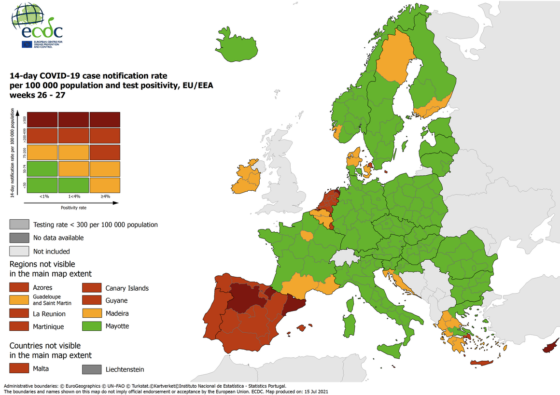As infections soar, the Netherlands turns red on new EU coronavirus map

 As expected, the Netherlands has turned red on the coronavirus infection map published by the European Centre for Disease Prevention and Control.
As expected, the Netherlands has turned red on the coronavirus infection map published by the European Centre for Disease Prevention and Control.
While the Netherlands is red as a whole, Groningen has become dark red – the highest risk level possible in the ECDC inventory.
Three weeks ago the Netherlands went from red to amber and green on the map, but since then the infection rate has soared by 500%, prompting the new assessment. Over 10,000 new cases were reported to the Dutch public health institute RIVM in the 24 hours to Wednesday morning.
The ECDC revises its risk ratings every Thursday.
Portugal, Spain, Luxemburg and Cyprus are also red, as are parts of Greece and Denmark. Ireland, Croatia, the rest of Greece and Denmark, Sweden and Finland are yellow.
Extra regulations
At the moment people can still travel on their EU CoronaCheck app, which states if they are fully vaccinated, have had very recent a negative test or recently recovered from coronavirus.
Although it is up to member states themselves whether they wish to impose extra restrictions on visitors from the Netherlands, they are now free to bring in a quarantine requirement or even an entry ban.
So far, no countries have yet said that they plan to impose new rules for Dutch holidaymakers but travellers are advised to check their destination to be sure. Britain, for example, requires people from the Netherlands to go into quarantine.
Foreign ministry
At the same time, the Dutch foreign ministry recommends against travel to Spain, for example, for all but essential journeys.
‘The outlook has changed completely within a week,’ Frank Oostdam, director of travel industry association ANVR. ‘Tens of thousands of people are losing their holidays.’
Travel organisations such as Tui and Sunweb are scrapping all their flights to the Spanish islands, Portugal and Cyprus because of the updated travel advice.
Documents
The ANWB motoring organisation is monitoring the situation on a country by country basis. The listings also include a summary of the measures in operation in each country – Dutch only.
‘Currently there are no structural border checks but if the situation worsens, they could be brought in,’ the ANWB warns. ‘Travellers should make sure they have all the necessary documents to hand, even if they have been fully vaccinated.’
Thank you for donating to DutchNews.nl.
We could not provide the Dutch News service, and keep it free of charge, without the generous support of our readers. Your donations allow us to report on issues you tell us matter, and provide you with a summary of the most important Dutch news each day.
Make a donation